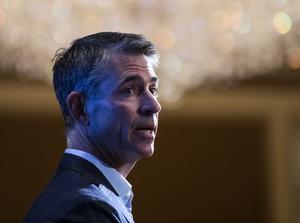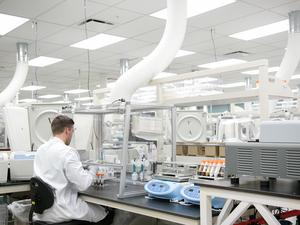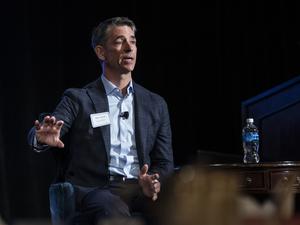When Kevin Conroy joined Exact Sciences Corp. as its CEO in 2009, the company had only three employees left after trying — and failing — for more than a decade to develop a stool-based colon cancer test.
Conroy moved the company to Madison and partnered with Mayo Clinic to bring the Cologuard test to market in 2014. Five years later, the company merged with Genomic Health Inc. to add the Oncotype IQ portfolio of cancer treatment optimization tests to its business.
Responding to Milwaukee Business Journal editor-in-chief Mark Kass during an Aug. 27 Power Breakfast, Conroy discussed Exact Sciences' vaccine mandates, Covid-19 testing efforts, how the company is using DNA markers to revolutionize early cancer detection and more.
The interview has been edited for clarity and length.
Exact Sciences recently implemented a vaccine requirement. How did that happen and what has the response been so far from employees?
“About three weeks ago, we had a meeting with 36 sales managers from all around the country, and we had a rule in place: If you weren't vaccinated, you had to be an adult and wear a mask… Two people chose to not follow that rule was one of them had Covid and exposed 34 other people who were in Madison from afar, leaving them in the situation not knowing whether they could travel back to their homes and get on planes, so we just made the decision right then, without much of a meeting, that we were just going to mandate vaccines.
“Our thinking was, we’re a health care company. These vaccines are safe and they're enormously safer than Covid.
“This Delta variant is not what we experienced a year ago. Hospitalizations are higher in the U.S. now than they were peak pandemic, so we just made the decision to do it. It's challenging because there are a lot of people that we really care about that we want to stay on the team who today aren’t vaccinated. So they have until Oct. 1, and I'm pretty confident that we'll get to about 97% of the people who choose to get vaccinated… We're probably around 80% now.”
What’s been the response from the employees who aren’t vaccinated? Has there been some anger?
“There’s been a politicization of this issue and it really shouldn't be politicized. Vaccines have worked for 2,000 years. Smallpox was eradicated because of vaccines... Everybody should be vaccinated. There isn’t anyone who should be worried about being vaccinated.
"I think we’ll come out of this a stronger company because I think that people are now understanding that they're doing something, not for themselves so much, but for the people they work with, a lot of whom are immunocompromised."
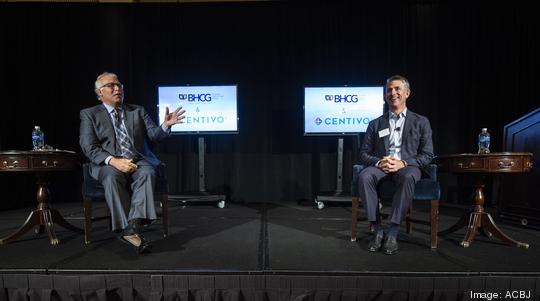
What kind of impact did the pandemic have on Exact Sciences’ operations? How did you respond?
"When the pandemic hit, colon cancer screenings around the country dropped 90%. They started to come back, but they’re still down about 15% to 20% because fewer people are going into their primary care physician. Primary care physicians are prioritizing bigger health issues that have been put off in the last year and a half. So we have a lot of work to do to get preventative medicine back to where it was before the pandemic.
"One of the things that the team did was bring a Covid test, because the state of Wisconsin is not certified in large by (Quest Diagnostics) and Labcorp, the two largest national labs, so we didn't have the testing infrastructure to do the huge number of Covid tests that were required to help us win the battle against Covid. So the team brought up in our facilities a sufficient amount of capacity to do Covid testing in three weeks and got FDA emergency authorization, and we ended up providing about 80% of all Covid tests in the state of Wisconsin.
"So we went from people having nothing to do to people having so much to do that people were working crazy hours and we made it through. That's one of the things I'm really proud of is the way that people rose to the occasion."
How many tests did you end up providing?
"Over 3 million tests."
How has the employee shortage impacted Exact Sciences? How many employees are you short right now?
"So we have 5,500 people across the country and 60% of them in Wisconsin. We have 1,000 job postings today… Over the last several years, we've always had about 500 job postings at any given the time.
"This is the first time that it has gotten a little bit more difficult to recruit people. We pay really good wages, everybody in the company gets equity in the company, everybody gets a good health plan, everybody is on the company bonus program."
What new things are you trying in order to recruit?
"One of the things that has worked in Dane County is our partnership with the Urban League… We've had a program where we train people who have been underemployed and we give them training in two main areas: laboratory work and also customer service work.
"It's a six-week program and we typically hire about 90% of the people who join that six-week program. So we help with the training, we support the Urban League and altogether we've hired about 150 people through those programs, and really just amazing team members who historically had part-time jobs or they weren't in a job that provided health care, and they've just become incredibly valuable team members."
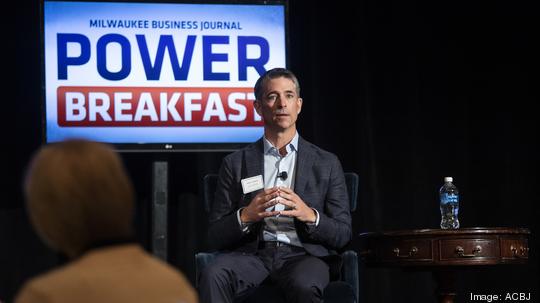
How did Exact Sciences end up in Madison and how has it grown there?
"Exact Sciences has a very interesting company story. It goes all the way back to 1996, a guy named Stan Lapidus who revolutionized Pap smear testing. He founded that company, it became very successful and then he decided he wanted to solve colon cancer the same way. He thought he would do basically a fecal smear looking for colon cancer cells on a slide and look at it under a microscope and very quickly he realized that wasn't the answer — the answer is that cancer is a disease of the DNA. Your DNA goes haywire, and if you can find those tiny little changes from a stool sample, you could actually eradicate colon cancer by getting everybody screened in the privacy of their home — that was his idea in 1996.
"The company pursued it until I joined in 2009, so 13 years later. The company had tried and tried and tried and never could make the test work. They had gone public, it had launched a test, it just didn't work.
"There were three people left when I joined the company. It was based in Boston, and Sheila and I and our girls were in Madison. I took the interview and went out to visit and I said, ‘Why are you pursuing this? The board of directors had eight people there are only three employees.’
"People talk about capitalism and they bash capitalism — only in America can you keep innovation like this alive for 13 years without making a profit.
"The board of directors said, ‘We're not giving up.' They sent me to the Mayo Clinic, where I sat down with Dave Ahlquist, who for 20 years had been doing research in this area, and he had data showing 98% of colon cancer is detected from stool samples by looking at a handful of DNA markers, these tiny little changes. So I left that meeting and said, Okay, I think I know what I'm going to be doing for the next several years.’ Well, that next several years has turned into 12.
"So it was a partnership with Mayo Clinic, and we recruited a team of people … and we developed this test. Altogether we’ve raised well over $2 billion, but we started by raising $9 million. And then we raised $14 million. And then we raised $30 million to keep funding this program until we got the FDA approval.
"I'll never forget, in that first meeting, David Ahlquist said — the first hour was spent talking about colon cancer. It is the number two cancer killer and 50% of people aren't getting screened — He said, ‘Let's put that aside for a minute. One in two men in this room will be diagnosed with cancer, one in three women. If you're under age 85, cancer is the number one cause of death. We don't screen people, we screen individual organs. We do breast cancer screenings, cervical cancer screenings, colon cancer screenings. And Dave made the case, what we should do is one blood draw, all cancers. I thought this was science fiction.
"All through our partnership, Dave just kept at it — we've got to develop a blood-based test. And right now, we are set to launch clinical trials next year on a simple blood draw that will detect certainly the top 16 deadliest cancers but most likely dozens of cancers — we won't know how many cancers we’ll find until we go out there and study a really large population, but it will be one blood draw, the ability to detect all different cancers. Now it's not going to pick up 90% of cancers, but a test that every other year you would get that would pick maybe 50% of cancers early — the early-stage cancers.
"This has already been shown the proof of concept in a 10,000-patient study. A woman who signed up for this study, she just thought she was doing something good for society. Her name was Teresa and she didn't know that she had stage-one ovarian cancer. We've never been in stage-one ovarian cancer — it’s just not found because it is so small, it's not symptomatic. They found stage-one ovarian cancer, removed her ovaries and she had a bad week — maybe a bad two weeks. But she's not going to die from cancer. She's not going to get sick from ovarian cancer. That's the power of, her blood test was positive, she got a PET-CT scan, and she's going to celebrate birthdays and anniversaries…"
What stage is that test at and when will it be approved and available?
“It’s through proof of concept, we're doing two more clinical studies (at the) end of this year, beginning of next year, and next year we will start an 80,000-patient prospective clinical trial. We hope and plan for Ascension to be a part of that clinical trial, and that clinical trial will take a couple of years.
“We may make the test available as what's called a lab developing test before that in a limited way to help us collect more data. So patients willing to sign up for a registry, provide data in exchange for getting the testing are allowing us to study this more. That test may be available as early as next year."
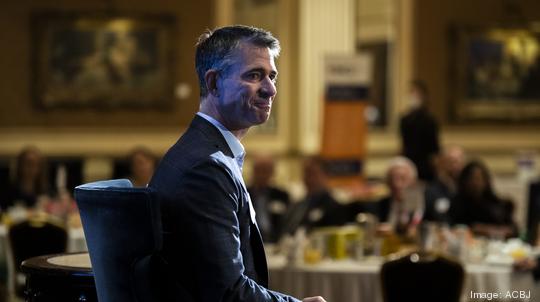
Where are you at now in terms of remote work, and is it a thing of the future for you?
"We're about half and half. Our office workers by and large are working from home, but not all of them — we encourage people to come into the office. We have testing, and in Dane County now we're wearing masks, in California people are wearing masks.
"I think it's going to be a mix. We were planning on bringing people back in September, we pushed that to October. …I think it's essential, ultimately, for people to be in the office, I think for those interactions to occur that allow you to grow as leaders and people and to come up with new ideas. But we’re not through this pandemic. I think we'll sort all of that once we come out of this and once people are safe."
How has this recent Covid-19 surge impacted Exact Sciences? Are you seeing what you saw 12 months ago?
"There’s no reason that Wisconsin isn't going to see what's going on in Florida and Texas and elsewhere, which is not pretty.
"It's impacting us because as fewer people are going into the doctor's office, fewer people are getting screened. When fewer people are getting screened, what we're seeing now is an uptick in late-stage breast cancer, late-stage colon cancer, late-stage cervical cancer. Cervical cancer is a disease that has been largely eradicated in America because of screening, and we're seeing an uptick in all of those things.
"As long as there's Covid, it's going to impact us as a company. We try to focus on the long term, and the long term is, just keep building a company that is going to be successful five years from now."
What’s your outlook on Exact Sciences for this year and next year?
"As we have talked about on our earnings calls, we're really positive about the direction of the company in the short term and the long term. Why we're so positive about the long term is, we're bringing this multi-cancer screening test to people. We are also bringing a test that is going to change the way people who are treated for cancer are treated — it's called a test for minimal residual disease.
"By looking into a patient's blood, you can actually see whether their cancer has recurred nine months sooner than a CAT scan. So, in the very near future, you'll be able to treat somebody post-surgery because this test answers the question, ‘Did you get it all?’ And then if that test comes back, ‘No you didn't get it all,’ you can keep treating with chemotherapy or a different therapy. And if the test comes back, ‘Yes, it appears we've got it all,’ you can get that test every three or six months, picking up cancer when it first starts to recur and go back into treatment.
"This amazing technology is, again, this insight that cancer is a disease of the DNA, and if you could go into a patient's tumor and find mutations in the DNA that are unique to that tumor, and then look for those mutations in that person's blood to change the world. So we're bringing both the multi-cancer test and the minimum residual disease test to health care systems all across the country and all over the world.
"This is going to change cancer forever. Cancer has been treated mainly with surgery and chemotherapy and now, new drugs that target these changes in the genes that actually work in a molecular level... We’re probably in the second inning of a massive change in medicine due to the knowledge of the power of the human genome and the cancer genome.
"We're leading the way there and we invest hundreds of millions of dollars a year in research and development to continue to be the leader. Much of that is done here in Wisconsin. It's an amazing, amazing state to bring research scientists onto the team and develop new products.
"We don't invest enough in the University of Wisconsin — it is almost criminal that we are not investing more in one of the most amazing universities in the country in (research and development). ...We've got to keep investing there, it's a gem of this state, and we would not be here without it.
"We also need to work on getting more entrepreneurial capital into the state. A fund of funds. …Carrie Thome, she's been working for two years to raise capital, I think they’re going to launch a $50 million fund of funds, which helps seed small venture capital funds, which helps seed companies like ours, years ago."
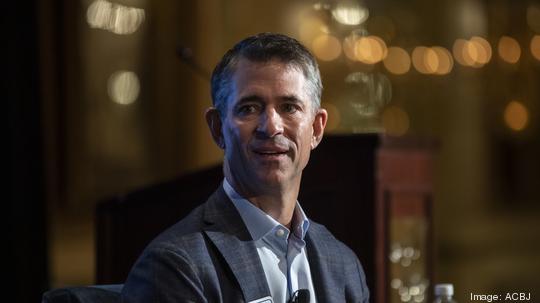
What kind of growth does Exact Sciences expect in Wisconsin?
"We have two labs in Dane County, we're building a third lab. Each of these labs will employ 1,500 people and we'll just keep investing because it's a great place to hire people, train people, develop people, and who knows — maybe one of our labs will be here in Milwaukee. We've actually looked at that and we know we want to go where the people are and where we can continue to invest in people."
So is that an option to have one in Milwaukee at some point?
"It's not forefront right now, but it is one of the areas we're looking at. I'm always concerned about going to yet another location where you're now dispersing your leadership team that runs the labs, and it all comes back to that leadership. So, we will take a look at Wisconsin broadly, including southeastern Wisconsin."
